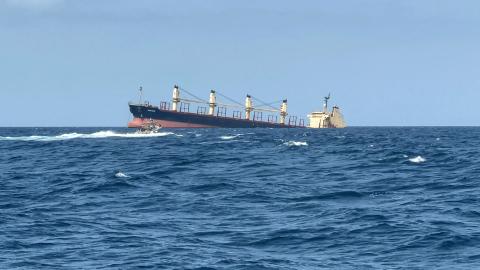The Houthis, a group trained and armed by the Iran regime, have sunk a British-owned bulk carrier called the Rubymar. The ship, carrying 41,000 tons of fertilizer, was hit by a Houthi-fired anti-ship missile on February 18th and on March 2nd finally sank, the wreckage spewing an 18-mile oil slick in the Red Sea. It is an ecological disaster and a US humiliation.
Why would a militant group’s attack on a ship that isn’t directly connected to America be a humiliation for the United States? Because one of the precepts of the US-led international order since the Second World War is free and open seaborne commerce. And it’s not just that this militant group successfully sank this ship, it’s that they have repeatedly attacked seaborne trade, and the United States with its allies, have not convinced either the Houthis or its patron, the Iran regime, to stop the assaults.
Since the ghastly Hamas attacks against Israel on October 7th, Iranian-trained militants around the Red Sea as well as in Iraq and Syria have been launching attacks against US forces and commercial shipping. Their expressed reason is to compel the United States to exit the region and end its support for the Jewish State. In the face of these attacks, the Biden administration has not officially removed its support from Israel’s military campaign against Hamas in Gaza or left the region—to its credit. But, it has chosen a retaliatory response against the Houthis that is shockingly sparing and designed to allay Iran’s concern that the United States might strike it, and strike it too hard.
In early February, the United States launched an attack with the UK against Houthis in Yemen, after warning the enemy that the attacks were coming, and leaking through the media about the general locations of the impending attacks. This had the effect of providing time for the militants to leave the scene, along with any other mobile weapon systems.
A US statement, with allies, said: “Our aim remains to de-escalate tensions and restore stability in the Red Sea but let us reiterate our warning to Houthi leadership: we will not hesitate to continue to defend lives and the free flow of commerce in one of the world’s most critical waterways in the face of continued threats.”
As is the case with US support to Ukraine, the Biden administration is laser-focused on this aim: to de-escalate and restore stability.
After two years of hearing Biden officials fret about supporting Ukraine only enough to avoid escalation and to return to stability, one might be excused for emphatically demanding the administration define what these goals mean. Things don’t feel stable. It sure looks like the outcomes of their escalation-sensitive efforts have led to more attacks, more violence, and more adversary advantages.
In 2005, the US Department of Defense established “stability operations” as a core US military mission. The operations are meant to achieve the goal of maintaining or re-establishing “a safe and secure environment, providing essential governmental services, emergency infrastructure reconstruction, and humanitarian relief.” Said plainly, stability is peace.
This brings us back to the post-WWII precept of free and open international waters. The United States’s assurance to allies, partners, and competitors alike, that a world order led by the United States of America is one where nations cannot block trade, cannot strike commercial ships, cannot destroy the global commons, without the promise of the might of the US military coming down on the heads of the aggressors, is slipping away before our eyes.
It does not have to be this way. This is a choice.
The United States has the might to crush the Houthis. The United States has the political clout to work with allies to band together to punish the Iran regime. The United States can convince Iran to end these terror attacks against civilian international shipping.
Rather than aim to “de-escalate”—the aim should be for “stability”— a return to peace on just terms. And for decades, maintaining the peace has required the United States’ ability and will to escalate.


















